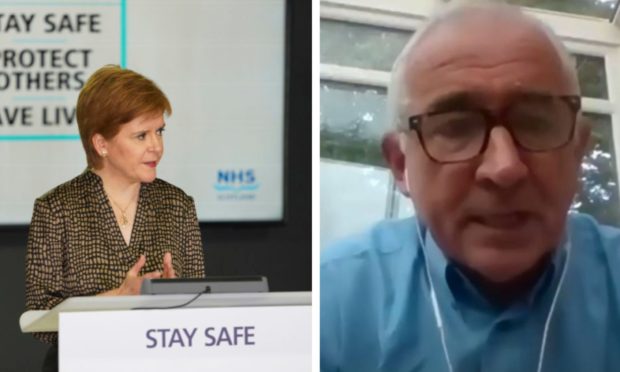A BBC Scotland executive has explained the reasons behind the decision to stop broadcasting daily Nicola Sturgeon’s coronavirus update briefings.
Ian Small, head of public policy, appeared on The Nine on Friday amid calls for the broadcaster to reverse its decision.
The BBC has said it will continue to stream the briefings live online, but will only televise them when major developments are expected.
He told John Beattie: “We’re looking at the way the situation is evolving and we’ve been looking at that clearly over the last few weeks.
“And we’ve seen that, the last two weeks aside, I would say that things were slowly getting back to normal, people were going back to work, services were going back online, schools were going back and the parliament clearly was back in business as well.”
He said there had been some misreporting about the issue and there had been claims the BBC was moving away or “abandoning” the briefings.
“That is simply not the case,” he said.
“We will continue to cover the briefing when there is evidence of clear messaging that requires to be given across. But I would emphasise that we are not stopping doing briefings. To suggest that is simply untrue. We’re simply finding ways which can better impart that information.”
On Monday new restrictions around social gatherings come into force in Scotland and Mr Small said the BBC will “be on hand to provide live coverage”.
Mr Beattie asked the executive if he would rule out saying they had made a mistake or consider a u-turn. Mr Small replied: “I don’t think it is a question of making a mistake. What I will say is we will keep this under review. The BBC is not perfect, no news organisation is perfect. We’ve taken a decision that we think will work in that overall approach but if we were to find there is a better approach to be taken we would look at that as well.”
He added they believed the decision they had taken “in the circumstances is the right one”.
He was also asked by Mr Beattie if the broadcaster had come under any political pressure when making the decision.
Mr Small said there had been “treaties” made to them by political parties but that was not unusual.
“That’s an everyday event for the BBC,” he added.
“But what I can clearly say is that all the decisions around this have been made by our editorial teams, by our news teams by our editorial stance team basically.
“We have determined that the best way forward would be not necessarily to be there every single day but to be there when important messages are being imparted.”
First Minister Nicola Sturgeon was asked about the issue at her daily briefing on Friday.
She said: “What is broadcast on the BBC is a matter for the BBC but we are in unique circumstances right now and the ability for me and my colleagues to communicate directly with the public has never been more important than it is right now.
“I have always taken great care to try not to stray into political territory, I’m not saying I’ve never slipped up – I am fallible.
“But I’ve always recognised my responsibility to keep these briefings very much on topic because I want people regardless of their politics to be able to listen and hear the messages that are so important.”
She said older people who do not have access to the internet and people with disabilities have found the briefings “particularly important”, saying there has been “fantastic BSL translation throughout all of this”.
The First Minister added: “All I would ask is that they (the BBC) take all of that into account in the decisions that they make.”
